Thesis Chapters by Lars Holmboe
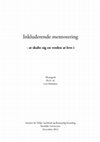
Inclusive mentoring
- creating a world to live in
Monografi
Ph.D.
Lars Holmboe
University of ... more Inclusive mentoring
- creating a world to live in
Monografi
Ph.D.
Lars Holmboe
University of Roskilde
Denmark
Summary
In the last 10 years I have worked professionally with mentorship schemes. I have created concepts, recruited mentors, interviewed the people who wished to have a
mentor, evaluated mentorships and mentorship schemes, arranged courses, workshops and conferences for mentors. The mentorship schemes I have worked with are schemes that have been initiated for so-called ‘vulnerable citizens’. Through
the years as a professional I have increasingly wondered what happens with the people who get a mentor. What does the mentor relation lead to? That is my main motivation for exploring the inclusive mentor relation.
A couple of years ago I ran a course for volunteer mentors. To get the conversation going I decided to start the course with a question. Can you remember a person you have met in your life who has meant that your life in some way or other changed direction? They were to come back to the mentor colleagues and me and tell us about an informal mentor relation that had had an influence on their personal course of life. The following question from me as course leader revolved around what it was that had meant that this particular relation had had such a
big significance for them. My intention was to direct the entors towards how meaningful it is to work with practice stories. Stories about meaningful relations, whether they were informal or formal and arranged. Several of the mentors were
of course doubtful, but the stories they provided were powerful. The reciprocal stories opened up for conversations about dilemmas and values. What is it that creates turning points in their lives? What role does the other person play?
Because it is in reality difficult to come up with a clear definition of what a mentor relation is, the stories provided by the mentors show that this type of relation is best understood as part of its own context.
My dissertation focuses on what I call inclusive mentoring. That is to say a particular development and empowerment orientated relation where mentor helps the recipient of the mentoring, the mentee, with clarifying and developing professional, personal and social competencies. In my view the mentor relation is a process where an informal transfer of knowledge, social capital and psychosocial support takes place. A knowledge which is perceived by the mentee as relevant in
relation to the life situation and personal development he or she is in.
The question is how receiving a mentor reduces the mentee’s risk of marginalisation and exclusion. In my view arginalisation is characterised by being a fundamental process which in several ways limits the mentees opportunities for self-expression. This marginalisation concept, in conjunction with concepts such as inclusion, practice communities, trajectories of participation and supportive relations, forms part of the set of concepts of guidance that I present in my exploration of inclusive mentoring schemes.
Key research questions in the dissertation are:
1) What does the mentee get out of getting a mentor, 2) the question of what kinds of processes mentor and mentee enter into and 3) how we can understand the different strategic and political interests that underlie offerings of inclusive mentoring schemes.
The mentoring schemes in employment programmes can be seen as an element in the development of a more inclusive and accommodating labour market. The intention is to secure, prevent and integrate. That is to provide security for
employees that are at risk of being made redundant due to age, illness or the like. And to include unemployed who have difficulties getting into the labour market because of ethnicity, long-term unemployment, reduced ability to work or similar
barriers. And to prevent accidents and wearing out through a strengthened work environment effort in such a way that as many people as possible maintain the full ability to work all their life. Alongside the statutory work-related and ernmentally funded mentoring schemes that are administered by the job centres all over the country, a large number of mentorship schemes based on volunteering and unpaid mentors have been established in the last decade.
It is my experience that there are holes in the research-based knowledge we have about inclusive mentorship schemes. A large number of evaluations and metastudies of evaluations exist, whereas actual qualitative studies are difficult to come
across. My research is based on ethnographic, qualitative and interactive studies of inclusive mentorship schemes.
In my dissertation I refer to the collection of qualitative data as an interactive working method. That is to say, an approach where I in addition to employing traditional collection of semi structured interviews also expand the concept of participating observation by experimenting with different data collection arenas. I choose to explore the inclusive mentor relations by carrying out a large number of
Papers by Lars Holmboe
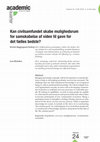
Bringing knowledge of people with lived experience of mental distress at stake in developing psyc... more Bringing knowledge of people with lived experience of mental distress at stake in developing psychiatric services has increased. The challenge thou are, that experienced knowledge is not recognized being as valid as professional knowledge. We will investigate how civil organizations can play an active role in developing communities of practice to underpin recovery processes of vulnerable people. By looking at capabilities, we look at what people are capable of, what interest and resources each person holds and what it takes to become participants of new communities of practice. Being a participant seems to strengthen a feeling of being a person of value and to be the driver of your recovery process, which is important knowledge for society to include in the strive of co-constructing 'the common good'. So, what happens if we invite these people into co-construction of knowledge, practices, and policies for the sake of the 'the common good'?
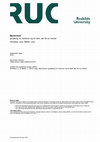
Arbejdet med guiden er muliggjort med en bevilling af Tips og lottomidlerne. Hvor skal vi hen, du... more Arbejdet med guiden er muliggjort med en bevilling af Tips og lottomidlerne. Hvor skal vi hen, du? Til Mentor-land. Turen går til Mentor-land er en guidebog til nye faellesskaber. Det er først og fremmest en guidebog til mentor-relationen mellem en mentor og den, der har brug for en mentor til at hjaelpe med at finde vej ind i de nye faellesskaber. Og det er det, alle sociale mentor-ordninger handler om: Hovedpersonen i et mentor-forløb er den, som har brug for hjaelp til at komme videre i sit liv og finde ind i nye faellesskaber, på en arbejdsplads, i en uddannelse og i fritiden, eller generobre de faellesskaber, som man af en eller anden grund er kommet ud af. Punktum. Det viser den forskning i sociale mentor-ordninger, som danner udgangspunkt for bogen. Vejen til en mentor-ordnings succes går via alle mulige andre mennesker end metoren og de sagsbehandlere og koodinatorer, som eventuelt står bag ordningen. Sat uden før døren Velfaerds-samfundets mentor-ordninger er til for dem, som af en eller anden grund er blevet ekskluderet fra samfundets store faellesskab. en del er unge eller handicappede, der aldrig har vaeret på arbejdsmarkedet før. Andre har brug for hjaelp til at fastholde deres job eller finde en ny plads på arbejdsmarkedet, måske gennem uddannelse. Det kan vaere efter sygdom eller faengsel. Andre er flygtninge eller indvandrere, der ikke blev integreret på det danske arbejdsmarked, og som kan bruge en mentors hjaelp til at at blive introduceret til det danske samfund eller finde ud af kulturen på en arbejdsplads. Andre igen har vanskeligheder på hjemmefronten og brug for hjaelp til at fastholde hverdagen, opdrage børnene og komme til haegterne, før man kommer videre. Her i bogen kalder vi dem alle sammen for hovedpersoner, for det er dem det handler om. dem de andre ikke må lege med Vores hovedpersoner står typisk i udkanten af samfundet. nogle er på bistand og understøttelse, andre på starthjaelp eller førtidspension. De har ikke noget til faelles, bortset fra at de modtager flere ydelser fra samfundet, end de betaler skat. Det vil velfaerdssamfundet gerne lave om på. Det er heller ikke sundt at stå udenfor, og der er også mere kriminalitet og ballade blandt de udstødte. Altsammen dyrt for samfundet. "Vi er dem, de andre ikke må lege med", sang Kim larsen i et hit, der bragte de udstødte tilbage i Turen går Til menTorland-guidebog for mentorer og for dem, der får en mentor 1. del 12 dele Start nye positive spiraler Der er brug for alle, men det er ikke alle, der får job. At vaere deltager på arbejdsmarkedet kraever, at man har noget at give til et job. Det bliver mere og mere kraevende på arbejdsmarkedet, og man skal hele tiden laere nye ting for at vaere med. når man er udenfor, laerer man ikke nyt. Det nedbryder ens selvtillid at vaere udenfor med en følelse af, at der ikke er brug for en. Det er en negativ spiral, for er man først udenfor, mister man let nogle af sine kompetencer, selv almindelige, dagligdags kompetencer som at stå op om morgenen og få noget fra hånden. ens arbejdsevne bliver ganske enkelt forringet af at vaere udenfor. et mål i mentor-forløbet kan vaere at nedbryde de følelser af ikke at du til noget. At vaere fuldgyldigt medlem af samfundet forudsaetter en tro på, at man faktisk kan bruges til noget og indgå i faellesskabet og tage ansvar som en ligevaerdig medborger. en mentor skal vaere med til at stoppe den negative spiral og hjaelpe med at finde det, som hovedpersonen kan og måske har vaeret god til. i stedet for at gå nedad skal hovedpersonen starte en spiral opad, med mentors hjaelp, og ikke bare bare en, men mange positive spiraler i de forskellige sammenhaenge, hovedpersonen er med i. Hvornår kan man bruge en mentor? Man kan have brug for en mentor, når man har svaert ved at få tingene til at ske, som man gerne vil. Vi kender alle til en onkel eller en anden voksen, som man som ung kunne spørge til råds, som var klog på livet, og som var god at snakke med. en mentor er sådan en. Det er i hvertfald ideen, at en mentor på grund af sine erfaringer kan hjaelpe en mindre erfaren person, når han eller hun har svaert ved at gå i gang med noget nyt. Mange får en mentor, fordi de skal i gang med et nyt arbejde, starte på en udddannelse eller, kan bruge hjaelp til at overskue dagligdagen for at komme videre. På vejen mod forandringer er det godt at have en mentor i baghånden-hvis man kommer i tvivl og har svaert ved at overskue det hele, eller hvis man bliver stresset eller nervøs. nogle hovedpersoner har vaeret arbejdsløse i lang tid, andre er på vej ind på arbejdsmarkedet, andre har vaeret ramt af sygdom. Vi lever af faellesskaber og kan ikke leve uden. At tabe faellesskabet fører i vaerste fald til, at man føler sig syg. Det er en negativ spiral, som mentor kan vaere med til at bryde. Hvad er en mentor egentlig? en mentor er en erfaren person, som hoverpersonen har tillid til, men ikke noget i klemme hos, og som kan og ved noget, hovedpersonen har brug for. en mentor-relation er et laerings-faellesskab mellem mentor og hovedpersonen, der ønsker forandringer i sit liv. forandringerne sker ikke, fordi man bliver klogere og klogere, men fordi mentor og hovedpersonen
DOAJ (DOAJ: Directory of Open Access Journals), May 20, 2022
sten arbejder bl.a. med metodeudvikling i projektet Relationer i bevaegelse samt dokumentation og... more sten arbejder bl.a. med metodeudvikling i projektet Relationer i bevaegelse samt dokumentation og evaluering af initiativer og projekter primaert indenfor det offentlige og i civilsamfundsregi.
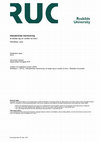
support takes place. A knowledge which is perceived by the mentee as relevant in relation to the ... more support takes place. A knowledge which is perceived by the mentee as relevant in relation to the life situation and personal development he or she is in. The question is how receiving a mentor reduces the mentee's risk of marginalisation and exclusion. In my view marginalisation is characterised by being a fundamental process which in several ways limits the mentees opportunities for self-expression. This marginalisation concept, in conjunction with concepts such as inclusion, practice communities, trajectories of participation and supportive relations, forms part of the set of concepts of guidance that I present in my exploration of inclusive mentoring schemes. Key research questions in the dissertation are: 1) What does the mentee get out of getting a mentor, 2) the question of what kinds of processes mentor and mentee enter into and 3) how we can understand the different strategic and political interests that underlie offerings of inclusive mentoring schemes. 19 SUMMARY traditional collection of semi structured interviews also expand the concept of participating observation by experimenting with different data collection arenas. I choose to explore the inclusive mentor relations by carrying out a large number of ethnographic interviews. The core of this method is, in my view, to observe some of what people do, listen to what they say, and thereby seek to register, understand and later interpret dilemmas, paradoxes and complex connections. In my field work I have carried out more than 50 interviews and arranged group interviews and workshops with mentees and mentors. It is not participant observation in the classical sense, but rather a extended field period where I arranged a number of dialogue arenas with informants and actors. My role in the field work varies between being a researcher and a process consultant. My professional past was an essential ballast for me in carrying out the field work, which took place over four years. My approach is inspired by the work method employed within practice and action research. In many ways there are similarities between the reflection and action orientated free space which characterises action research and the encouragement structure which characterises the inclusive mentor relation. In the mentor relation this encouragement structure is targeted towards individual competency and authority and freeing of the mentees resources. 22 SUMMARY Ultimately, it is the mentor's and mentee's judgment in the specific situation which determines to what extent the practice in question can be considered ethically justifiable. The institutional judgment is, so to speak, the control that the organisational ways of thinking exert on mentor's personal judgment. Is it possible to live up to the limitations that the organisational judgment puts on the mentorship and at the same time live up to the maintenance of the mentorship's autonomy? The answer could be to create a space for dialogue where both mentors and, if possible, mentors and mentees together, reflect on the content of the relational ethics through practice learning.
Aktionsforskning I Forbindelse Med Projektet "Tid Til Familie - Ældre Indvandreres Livskvalitet I Det Vestlige Århus

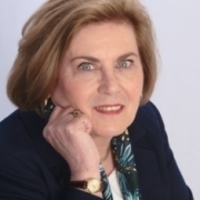





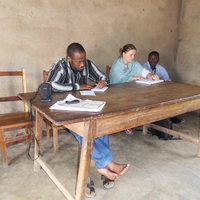



Uploads
Thesis Chapters by Lars Holmboe
- creating a world to live in
Monografi
Ph.D.
Lars Holmboe
University of Roskilde
Denmark
Summary
In the last 10 years I have worked professionally with mentorship schemes. I have created concepts, recruited mentors, interviewed the people who wished to have a
mentor, evaluated mentorships and mentorship schemes, arranged courses, workshops and conferences for mentors. The mentorship schemes I have worked with are schemes that have been initiated for so-called ‘vulnerable citizens’. Through
the years as a professional I have increasingly wondered what happens with the people who get a mentor. What does the mentor relation lead to? That is my main motivation for exploring the inclusive mentor relation.
A couple of years ago I ran a course for volunteer mentors. To get the conversation going I decided to start the course with a question. Can you remember a person you have met in your life who has meant that your life in some way or other changed direction? They were to come back to the mentor colleagues and me and tell us about an informal mentor relation that had had an influence on their personal course of life. The following question from me as course leader revolved around what it was that had meant that this particular relation had had such a
big significance for them. My intention was to direct the entors towards how meaningful it is to work with practice stories. Stories about meaningful relations, whether they were informal or formal and arranged. Several of the mentors were
of course doubtful, but the stories they provided were powerful. The reciprocal stories opened up for conversations about dilemmas and values. What is it that creates turning points in their lives? What role does the other person play?
Because it is in reality difficult to come up with a clear definition of what a mentor relation is, the stories provided by the mentors show that this type of relation is best understood as part of its own context.
My dissertation focuses on what I call inclusive mentoring. That is to say a particular development and empowerment orientated relation where mentor helps the recipient of the mentoring, the mentee, with clarifying and developing professional, personal and social competencies. In my view the mentor relation is a process where an informal transfer of knowledge, social capital and psychosocial support takes place. A knowledge which is perceived by the mentee as relevant in
relation to the life situation and personal development he or she is in.
The question is how receiving a mentor reduces the mentee’s risk of marginalisation and exclusion. In my view arginalisation is characterised by being a fundamental process which in several ways limits the mentees opportunities for self-expression. This marginalisation concept, in conjunction with concepts such as inclusion, practice communities, trajectories of participation and supportive relations, forms part of the set of concepts of guidance that I present in my exploration of inclusive mentoring schemes.
Key research questions in the dissertation are:
1) What does the mentee get out of getting a mentor, 2) the question of what kinds of processes mentor and mentee enter into and 3) how we can understand the different strategic and political interests that underlie offerings of inclusive mentoring schemes.
The mentoring schemes in employment programmes can be seen as an element in the development of a more inclusive and accommodating labour market. The intention is to secure, prevent and integrate. That is to provide security for
employees that are at risk of being made redundant due to age, illness or the like. And to include unemployed who have difficulties getting into the labour market because of ethnicity, long-term unemployment, reduced ability to work or similar
barriers. And to prevent accidents and wearing out through a strengthened work environment effort in such a way that as many people as possible maintain the full ability to work all their life. Alongside the statutory work-related and ernmentally funded mentoring schemes that are administered by the job centres all over the country, a large number of mentorship schemes based on volunteering and unpaid mentors have been established in the last decade.
It is my experience that there are holes in the research-based knowledge we have about inclusive mentorship schemes. A large number of evaluations and metastudies of evaluations exist, whereas actual qualitative studies are difficult to come
across. My research is based on ethnographic, qualitative and interactive studies of inclusive mentorship schemes.
In my dissertation I refer to the collection of qualitative data as an interactive working method. That is to say, an approach where I in addition to employing traditional collection of semi structured interviews also expand the concept of participating observation by experimenting with different data collection arenas. I choose to explore the inclusive mentor relations by carrying out a large number of
Papers by Lars Holmboe
- creating a world to live in
Monografi
Ph.D.
Lars Holmboe
University of Roskilde
Denmark
Summary
In the last 10 years I have worked professionally with mentorship schemes. I have created concepts, recruited mentors, interviewed the people who wished to have a
mentor, evaluated mentorships and mentorship schemes, arranged courses, workshops and conferences for mentors. The mentorship schemes I have worked with are schemes that have been initiated for so-called ‘vulnerable citizens’. Through
the years as a professional I have increasingly wondered what happens with the people who get a mentor. What does the mentor relation lead to? That is my main motivation for exploring the inclusive mentor relation.
A couple of years ago I ran a course for volunteer mentors. To get the conversation going I decided to start the course with a question. Can you remember a person you have met in your life who has meant that your life in some way or other changed direction? They were to come back to the mentor colleagues and me and tell us about an informal mentor relation that had had an influence on their personal course of life. The following question from me as course leader revolved around what it was that had meant that this particular relation had had such a
big significance for them. My intention was to direct the entors towards how meaningful it is to work with practice stories. Stories about meaningful relations, whether they were informal or formal and arranged. Several of the mentors were
of course doubtful, but the stories they provided were powerful. The reciprocal stories opened up for conversations about dilemmas and values. What is it that creates turning points in their lives? What role does the other person play?
Because it is in reality difficult to come up with a clear definition of what a mentor relation is, the stories provided by the mentors show that this type of relation is best understood as part of its own context.
My dissertation focuses on what I call inclusive mentoring. That is to say a particular development and empowerment orientated relation where mentor helps the recipient of the mentoring, the mentee, with clarifying and developing professional, personal and social competencies. In my view the mentor relation is a process where an informal transfer of knowledge, social capital and psychosocial support takes place. A knowledge which is perceived by the mentee as relevant in
relation to the life situation and personal development he or she is in.
The question is how receiving a mentor reduces the mentee’s risk of marginalisation and exclusion. In my view arginalisation is characterised by being a fundamental process which in several ways limits the mentees opportunities for self-expression. This marginalisation concept, in conjunction with concepts such as inclusion, practice communities, trajectories of participation and supportive relations, forms part of the set of concepts of guidance that I present in my exploration of inclusive mentoring schemes.
Key research questions in the dissertation are:
1) What does the mentee get out of getting a mentor, 2) the question of what kinds of processes mentor and mentee enter into and 3) how we can understand the different strategic and political interests that underlie offerings of inclusive mentoring schemes.
The mentoring schemes in employment programmes can be seen as an element in the development of a more inclusive and accommodating labour market. The intention is to secure, prevent and integrate. That is to provide security for
employees that are at risk of being made redundant due to age, illness or the like. And to include unemployed who have difficulties getting into the labour market because of ethnicity, long-term unemployment, reduced ability to work or similar
barriers. And to prevent accidents and wearing out through a strengthened work environment effort in such a way that as many people as possible maintain the full ability to work all their life. Alongside the statutory work-related and ernmentally funded mentoring schemes that are administered by the job centres all over the country, a large number of mentorship schemes based on volunteering and unpaid mentors have been established in the last decade.
It is my experience that there are holes in the research-based knowledge we have about inclusive mentorship schemes. A large number of evaluations and metastudies of evaluations exist, whereas actual qualitative studies are difficult to come
across. My research is based on ethnographic, qualitative and interactive studies of inclusive mentorship schemes.
In my dissertation I refer to the collection of qualitative data as an interactive working method. That is to say, an approach where I in addition to employing traditional collection of semi structured interviews also expand the concept of participating observation by experimenting with different data collection arenas. I choose to explore the inclusive mentor relations by carrying out a large number of